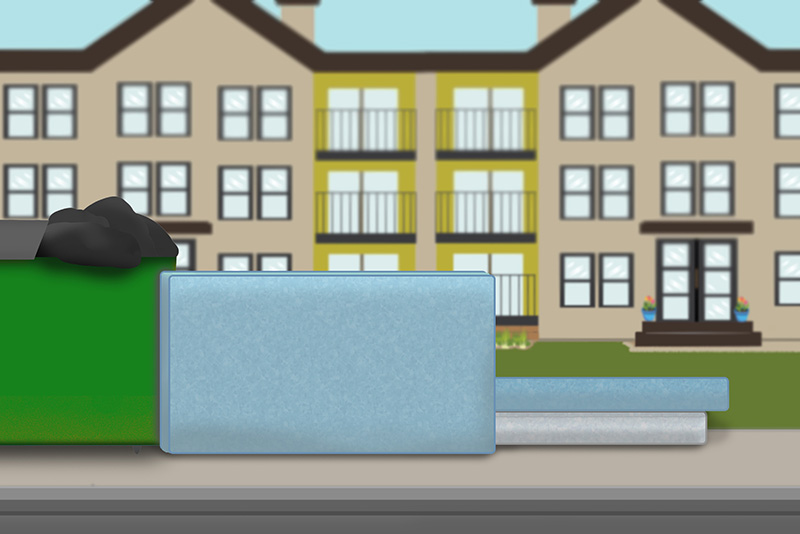State of Massachusetts Bans Mattress and Textile Disposal as of Nov. 1
By Kimberly Rau, MassLandlords, Inc.
The Massachusetts Department of Environmental Protection (DEP) expanded its waste disposal ban as of Nov. 1, 2022, to include mattresses and textiles.

New state bans on what can be disposed of at the curb mean that you’re going to have to find a new way to get rid of abandoned mattresses. Fortunately, there are many recycling companies who can help. Image License: CC by SA 4.0 MassLandlords Inc.
As any landlord will tell you, mattresses are frequently left behind in rental units when the tenant moves out. Under the new ban, you are no longer allowed to simply leave them on the curb or schedule them for trash pickup.
According to the DEP, discarded mattresses are “expensive to transport, hard to compact, take up lots of landfill space, and can damage incinerator processing equipment.” The DEP noted that up to 75% of a mattress is made of recyclable materials, but more than 600,000 mattresses and box springs are thrown away annually in Massachusetts.
What Counts as a Mattress Under the New Ban?
The state defines a mattress as “any resilient material or combination of materials that is enclosed by ticking, used alone or in combination with other products, and that is intended for sleeping upon, except for mattresses that are contaminated with mold, bodily fluids, insects, oil, or hazardous substances.”
Crib, twin, twin XL, full, queen, king and California king mattresses and box springs are included in the waste ban, as are full-foam or latex mattresses, sometimes called “mattresses in a box.”
If you have mattresses that are moldy or otherwise contaminated, you are encouraged to document the number of mattresses you have, along with their condition and how they were stored. You also need to note how they were managed to prevent contamination. In other words, you can’t leave a mattress outside in the yard until it gets moldy and then put it out for trash. But if your tenants left behind a moldy mattress in the bedroom, you may dispose of it without being in violation of the ban. You’ll want to keep documentation in case you’re asked for it.
What Do I Do With an Old Mattress?
Landlords and renters are unlikely to be able to legally resell a used mattress (the disclosure requirements of General Law Chapter 94 Section 272 probably cannot be met by anyone other than the retailer or manufacturer). But you don’t have to keep your old mattresses forever. The DEP recommends you donate mattresses that are in good condition. The Beyond the Bin Recycling Directory lists charities and other organizations that will accept mattresses for reuse or recycling. If your tenants leave behind mattresses that look like they’re in good shape, this could be worth looking into.
If the mattresses aren’t in great condition, see if your city or town has a mattress collection program. Some municipalities may not have their own program, but are regional participants in neighboring communities’ programs. You can check this map to see if your city or town participates in any kind of program.
If your tenants are buying a new mattress, educate them about a program that many retailers offer. A lot of companies will offer to haul away an old mattress when they deliver the new one as an incentive to buy from them. Try to make this your renter’s responsibility before it’s yours when their lease is up.
Conclusion
We can’t argue with facts. Mattresses are hard to dispose of, take up lots of room in landfills and are not good for the environment when they are simply thrown out. We also understand that this is going to create a headache for any landlord who finds their tenants left the unit but didn’t take their old mattresses with them. Many dumpster companies already do not allow mattress disposal. Others charge premiums to dispose of or recycle them for you. Check with your dumpster company to see what their policy is. It may be worth the charge for you to allow them to recycle the mattresses on your behalf. Or you may want to familiarize yourself with the options above and share them with your tenants to save time on move-out day.




